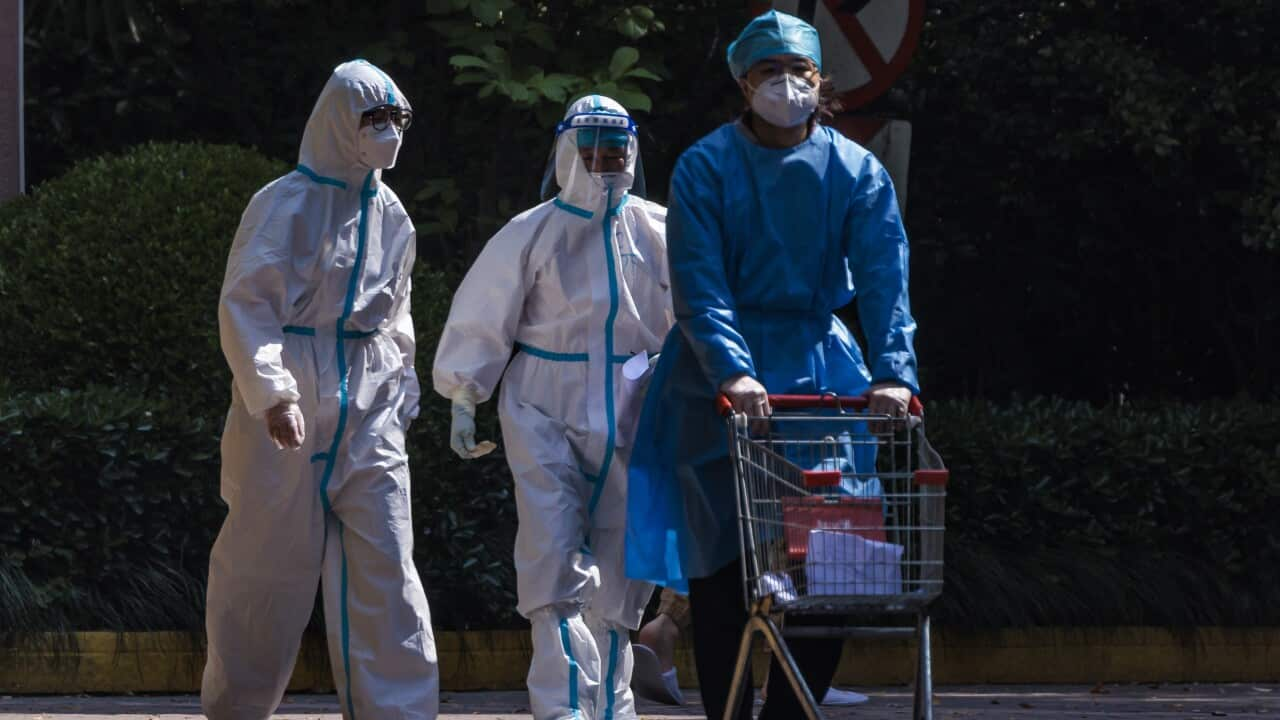North Korean leader Kim Jong Un said on Saturday that the spread of COVID-19 had thrust his country into "great turmoil" and called for an all-out battle to overcome the outbreak, while 21 new daily deaths were reported among people with fever.
North Korea made an unprecedented admission of its first COVID-19 outbreak this week and imposed a nationwide lockdown, after reporting no cases since the start of the pandemic two years ago. But there was no sign a rigorous testing or treatment campaign was underway.
"The spread of the malignant epidemic is a great turmoil to fall on our country since the founding," state news agency KCNA quoted Mr Kim as telling an emergency meeting of the country's ruling Workers' Party.
"But if we don't lose focus in implementing epidemic policy and maintain strong organisation power and control based on single-minded unity of the party and the people and strengthen our epidemic battle, we can more than overcome the crisis."
Given North Korea's limited testing capabilities, the numbers probably represent a fraction of total cases and could lead to thousands of deaths in one of only two countries without a vaccination campaign, experts have said.
The outbreak could also deepen an already dire food situation in the country, with the lockdown hampering anti-drought efforts and mobilisation of labour.
The Workers' Party meeting heard reports of about 280,810 people being treated and 27 deaths since a fever of unidentified origins was reported starting in late April, the KCNA said.
State media did not say whether the new deaths were due to COVID-19. The KCNA said on Friday that one death had been confirmed to be due to the Omicron variant of the coronavirus.
The meeting also heard a report from epidemic control officials that "in most cases, human casualties were caused by negligence including drug overdose due to lack of knowledge of treatment methods", the KCNA said.
Since late April, 524,440 people have shown signs of fever including 174,440 new cases on Friday, the KCNA said.
About 243,630 have been treated but the KCNA has not said how many people have been tested nor confirmed the total number of COVID-19 cases.
North Korea has been testing about 1,400 people a week, according to Harvard Medical School's Kee Park who has worked on health care projects in the country, but not nearly enough to survey the hundreds of thousands of people with symptoms.
'Sharing the destiny with the people'
Mr Kim said the health crisis had been caused by the incompetence and irresponsibility of party organisations, but the transmission was not uncontrollable and the country must have faith in its battle to overcome the crisis in the shortest possible period, the KCNA said.
He offered to donate medical supplies, which had been kept in his household, to be used by families that are experiencing particular hardship "with his resolution to always share the destiny with the people", the KCNA said.
Mr Kim also said health officials must learn from the experience of other advanced countries, including China's accomplishments in fighting the epidemic, the KCNA said.
There was discussion on urgently distributing medicine and adopting scientific treatment for people with fever and other symptoms to minimize casualties.
North Korea said that party officials, workers, and youth continued to be mobilized for work to prevent drought damages and for rice-planting in different parts of the country, the KCNA reported separately.
Mr Kim had ordered for economic and farm activities to continue when declaring a nationwide lockdown on Thursday.
North Korea has not reported on the possible source of the outbreak.
But a Seoul-based website that reports from sources in North Korea said late on Friday some students of a university in Pyongyang had tested positive after participating in an event on 1 May. Mr Kim had also attended the event.
The students had relatives who worked in trade with China and may have spread the virus when they subsequently visited their hometowns outside Pyongyang, the Daily NK website said citing a source in Pyongyang.
Reuters could not independently verify the report.
North Korea's border with China was reopened for trade early this year, but in April China suspended freight services between its Dandong city and the North Korean town of Sinuiju due to the COVID-19 situation on its side.












